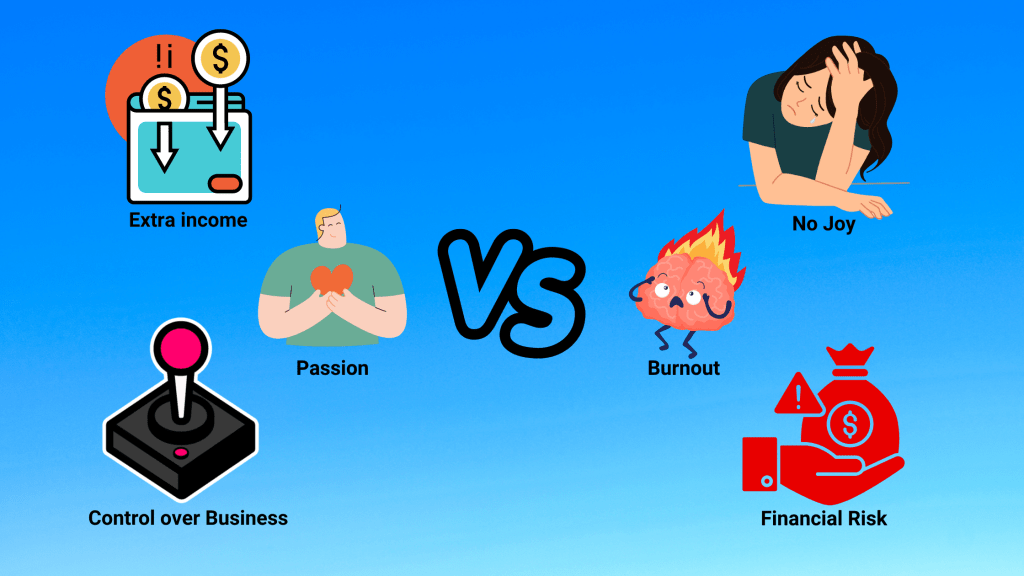Have you ever found yourself questioning whether you should monetize your hobbies? Maybe you enjoy baking, painting, or playing an instrument in your free time and have thought about turning it into a business. On one hand, turning your hobby into a source of income can be a fulfilling and lucrative venture. On the other hand, it can take the joy out of the activity and lead to burnout. So, should you stop trying to monetize your hobbies?
This is a question that many individuals have grappled with. While monetizing a hobby can lead to financial gain and allow individuals to turn their passion into a career, it can also take away from the intrinsic enjoyment and relaxation that comes with engaging in a personal activity. In this article, we will explore the pros and cons of monetizing hobbies and provide tips on how to maintain the joy and passion for the activity, whether or not you decide to turn it into a business.
The Pros of Monetizing Hobbies
Earn Extra Income
Monetizing hobbies can offer an excellent opportunity to generate additional income. Individuals who have a passion for their hobby and possess the required skills can transform it into a profitable business. For instance, individuals with photography expertise can establish a photography business and sell their services. Similarly, people with baking skills can begin a baking business and sell their products.
Pursue Your Passion
Transforming a hobby into a business enables individuals to pursue their passion full-time, which can provide a sense of fulfillment and satisfaction in their work. This way, they can engage in what they love and make money simultaneously, leading to greater job satisfaction.
Control Over Your Business
Monetizing a hobby provides individuals with control over their business, giving them the ability to set their own hours, choose their clients, and decide how much to charge. This sense of independence and freedom can be empowering and provide a greater sense of control over their work.

The Cons of Monetizing Hobbies
Takes the Joy Out of the Activity
Turning a hobby into a business can have a downside as it can lead to the loss of enjoyment and relaxation in the activity. What was once a calming and pleasurable pastime can become a stressful job. The pressure to continually produce and sell can detract from the reasons why the hobby was pursued in the first place.
Risk of Burnout
Monetizing hobbies can also have a negative impact by leading to burnout. Once an individual transforms their hobby into a business, they are no longer pursuing it solely for pleasure. Rather, they must also concern themselves with generating a profit, which can be stressful and time-consuming, potentially leading to burnout.
Financial Risk
Starting a business can also be costly, and if an individual is unable to generate sufficient revenue to cover their expenses, they may end up losing money. Monetizing hobbies requires a significant amount of time and effort, as running a business requires attention to various aspects of the operation. This can detract from the time spent actually engaging in the hobby, resulting in less enjoyment and less time to develop and improve one’s skills.
Factors to Consider
When considering whether to monetize a hobby, individuals should take into account several factors:
- Passion for the Hobby: The level of passion for the hobby is an important factor to consider. If one is passionate about their hobby and enjoys it immensely, turning it into a business may not necessarily take the joy out of it. However, if the hobby is only moderately enjoyable or they are not truly passionate about it, monetizing it may lead to burnout and frustration.
- Skill Level: The skill level is another important factor to consider. If someone has a high level of skill in their hobby and enjoys it, they may be more successful in monetizing it. However, if they are not skilled enough or lack the necessary expertise, the business may not be successful.
- Market Demand: The market demand for the hobby is another important consideration. If there is a high demand for the hobby, it may be easier to monetize it. However, if the market is already saturated or there is low demand, it may not be profitable to turn it into a business.
- Time Commitment: Monetizing a hobby requires a significant time commitment. If one is already busy with work or family obligations, they may not have enough time to devote to a business. It is important to consider the time commitment before deciding to monetize a hobby.
- Lifestyle Goals: Lifestyle goals are another important consideration when deciding whether to monetize a hobby. If someone’s goal is to have a flexible schedule and work from home, monetizing their hobby may be a good fit. However, if they value their free time and do not want to take on the additional responsibilities of a business, keeping their hobby as a personal activity may be a better fit.

Tips for Monetizing Hobbies
When individuals decide to monetize their hobby, there are several tips that can help maintain the joy and passion for the activity:
Set Realistic Expectations
Setting realistic expectations for the business is essential. Starting a business requires time, effort, and resources, and building a customer base and earning a profit takes time. Setting achievable goals and remaining patient can keep individuals motivated.
Find Balance
Maintaining a balance between doing the hobby for pleasure and doing it for business is crucial. Taking breaks and continuing to enjoy the activity as a hobby is essential. Individuals should remember why they started the hobby in the first place and make time to enjoy it.
Continuously Learn and Improve
Continuously learning new skills and improving craft can help individuals stay motivated and interested in their business. Attending workshops, taking classes, and networking with others in their industry can keep individuals updated with the latest trends and improve their skills.
Conclusion
In conclusion, the decision to monetize a hobby or not depends on personal goals and circumstances. If someone is passionate about their hobby and has the skills and market demand to turn it into a business, they may find success and fulfillment in monetizing it. However, if they value their hobby as a source of relaxation and personal growth, it may be best to keep it as a non-monetary activity.
Monetizing hobbies can be a great way to earn extra income, pursue one’s passion, and have control over the business. However, it can also take the joy out of the activity, lead to burnout, and have financial risks. It is important to consider the factors mentioned above and make a decision based on personal goals and circumstances.
Whether someone decides to turn their hobby into a business or keep it as a personal activity, the most important thing is to continue to enjoy and find fulfillment in the hobby. They should remember why they started the hobby in the first place and make sure to take time to enjoy it.








![Top 5 Personal Branding Examples [2024]](https://fueled.community/wp-content/uploads/2024/05/Source-Proideators.com-9-551x431.png)


Leave feedback about this